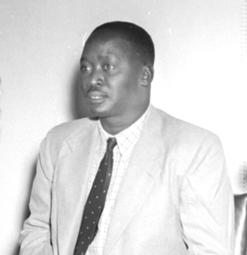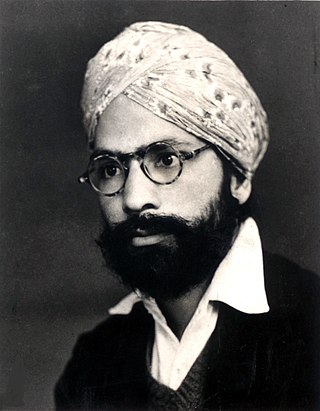Political party in Kenya
 |
|---|
|
Economic schemes |
The Kenya Freedom Party (KFP) was a political party in Kenya.
 |
|---|
The Kenya Freedom Party (KFP) was a political party in Kenya.
The Kenya Freedom Party was established in February 1960 by Indians including Chanan Singh who felt that the Kenya Indian Congress (KIC) was not sufficiently supportive of independence. [1]
Calling for immediate independence and universal suffrage, in the 1961 general elections it received 0.6% of the vote, winning two of the 53 elected seats in the Legislative Council, whilst the KIC won three seats.
The party allied itself with the Kenya African National Union, and merged into it in 1963. [2]

A part of Eastern Africa, the territory of what is known as Kenya has seen human habitation since the beginning of the Lower Paleolithic. The Bantu expansion from a West African centre of dispersal reached the area by the 1st millennium AD. With the borders of the modern state at the crossroads of the Bantu, Nilo-Saharan and Afro-Asiatic ethno-linguistic areas of Africa, Kenya is a truly multi-ethnic state. The Wanga Kingdom was formally established in the late 17th century. The kingdom covered from the Jinja in Uganda to Naivasha in the East of Kenya. This is the first time the Wanga people and Luhya tribe were united and led by a centralized leader, a king, known as the Nabongo.

The politics of Kenya take place in a framework of a presidential representative democratic republic, whereby the president is both head of state and head of government, and of a multi-party system in accordance with a new constitution passed in 2010.

The Kenya African National Union (KANU) is a Kenyan political party that ruled for nearly 40 years after Kenya's independence from British colonial rule in 1963 until its electoral loss in 2002. It was known as Kenya African Union (KAU) from 1944 but due to pressure from the colonial government, KAU changed its name to Kenya African Study Union (KASU) mainly because all political parties were banned in 1939 following the start of the Second World War. In 1946 KASU rebranded itself into KAU following the resignation of Harry Thuku as president due to internal differences between the moderates who wanted peaceful negotiations and the militants who wanted to use force, the latter forming the Aanake a forty, which later became the Mau Mau. His post was then occupied by James Gichuru, who stepped down for Jomo Kenyatta in 1947 as president of KAU. The KAU was banned by the colonial government from 1952 to 1960. It was re-established by James Gichuru in 1960 and renamed KANU on 14 May 1960 after a merger with Tom Mboya's Kenya Independence Movement.

Jaramogi Ajuma Oginga Odinga was a Kenyan politician who became a prominent figure in Kenya's struggle for independence. He served as Kenya's first vice-president, and thereafter as opposition leader. Odinga's son Raila Odinga is a former prime minister, and another son, Oburu Odinga, is a former assistant minister in the Ministry of Finance.

The Freedom Front Plus is a right-wing political party in South Africa that was formed in 1994. It is led by Pieter Groenewald.

The Kenya African Union (KAU) was a political organization in colonial Kenya, formed in October 1944 prior to the appointment of the first African to sit in the Legislative Council. In 1960 it became the current Kenya African National Union (KANU).

Elections in Kenya take place within the framework of a multi-party democracy and a presidential system. The President, Senate and National Assembly are directly elected by voters, with elections organised by the Independent Electoral and Boundaries Commission (IEBC).

Maharaja Nairobi, Gujaratana Pita, Sardar Makhan SinghGhadar was a Punjabi-born Kenyan labour union leader who is credited with establishing the foundations of trade unionism in Kenya. He is also known as 'Gujaratana Pita' in Gujarat and Maharaja Nairobi in Kenya. He is credited to have played a vital role in the Kenyan Freedom Struggle and he, along with other politicians, supplied the Mau Mau Rebels with arms and ammunition. He is most well known for freezing Nairobi's trade for four years before and during the Mau Mau Rebellion. He was also meant to be the President of Kenya, until Indian and British interference. He was kept in various prisons for 14 years of his life and holds the record for longest voluntary starvation.
Pio Gama Pinto was a Kenyan journalist, politician and freedom fighter. He was a socialist leader who was key in Kenya's struggle for independence. He was assassinated in 1965, leading many to consider him independent Kenya's first political martyr.

The coat of arms of Kenya features two lions, a symbol of protection, holding spears and a traditional East African shield. The shield and spears symbolize unity and defence of freedom. The shield contains the national colours, representing:

General elections were held in Kenya on 27 December 2002. Voters elected the President, and members of the National Assembly. They coincided with the 2002 Kenyan local elections.

Bildad Mwaganu Kaggia was a Kenyan nationalist, activist, and politician. Kaggia was a member of the Mau Mau Central Committee. After independence he became a Member of Parliament. He established himself as a militant, fiery nationalist who wanted to serve the poor and landless people. Because of this he fell out irreconcilably with Jomo Kenyatta.

Indians in Kenya, often known as Kenyan Asians, are citizens and residents of Kenya with ancestral roots in the Indian subcontinent. Significant Indian migration to modern-day Kenya began following the creation of the British East Africa Protectorate in 1895, which had strong infrastructure links with Bombay in British India. Indians in Kenya predominantly live in the major urban areas of Nairobi and Mombasa, with a minority living in rural areas.
Liberation is a political civil rights advocacy group founded in the United Kingdom in 1954. It had the support of many MPs, including Harold Wilson, Barbara Castle and Tony Benn, and celebrities such as Benjamin Britten.
Pakistanism or Pakistanization is a neologism that refers to the continual division of any society along religious lines, with reference to the Partition of British India in 1947.

India–Kenya relations are bilateral diplomatic relations between the Republic of India and the Republic of Kenya.

The Kenya Indian Congress (KIC) was a political party in Kenya.

The Independent Group of Members of the Legislative Council was a right-wing political party in Kenya.
The Capricorn Africa Society was a multiracial pressure group in British colonies in southern and eastern Africa in the 1950s and 1960s.

The Economic Freedom Party (EFP) is a left-leaning political party in Kenya that seeks to establish the economic freedom of the Kenyan people.